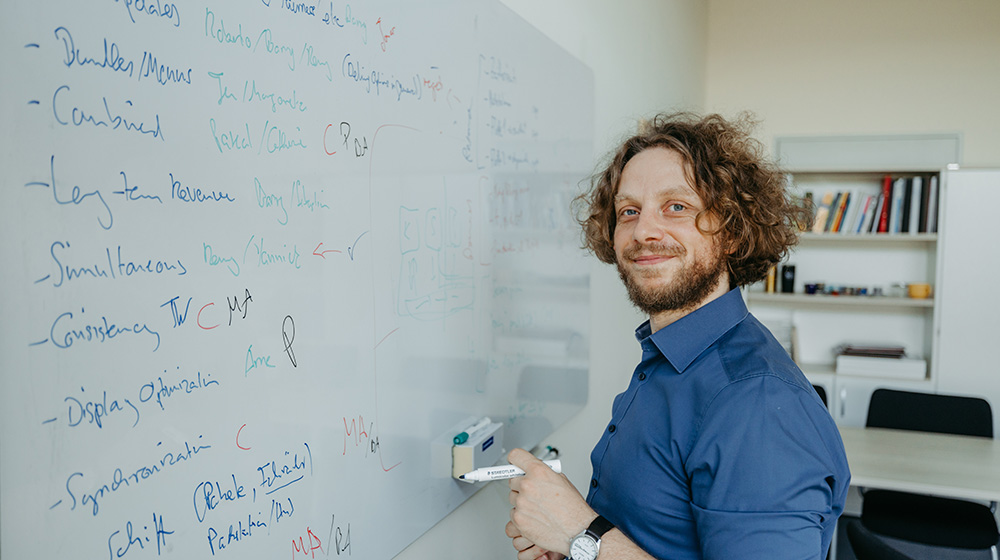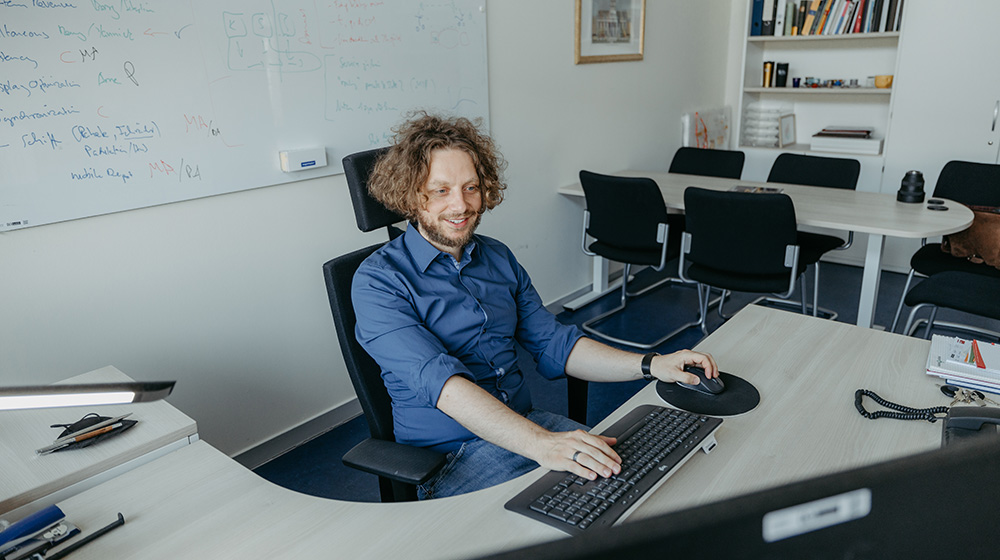
Pizza, packages, movies - in our time we can have everything at any time, especially if we live in the city. Many needs can and should be satisfied in the shortest possible time. This is especially true in cities. For many services and products, we don't even have to leave our homes. But how does this actually work? Service companies, or rather their employees, are not waiting to bring us our packages right now. Or to deliver that one chip from the supermarket to our doorstep that we're craving right now. Because it can hardly be economical. Yet there are now many companies offering it. "With inner-city services, there is a transformation toward on-demand," says Prof. Dr. Marlin Ulmer of the Faculty of Economics. Needs are being met faster and faster, he adds. But planning within the company is becoming more difficult because there are many uncertainties. They know nothing: Customers book comparatively unpredictably, drivers or suppliers can reject job offers, the fleet can be too small, too big or just far away. Prof. Dr. Marlin Ulmer at Otto von Guericke University Magdeburg is researching with his team at the Chair of Business Administration, in particular Management Science, how companies can better serve these uncertainties in the future.
Companies can never predict exactly when someone will book a cab ride, a supermarket delivery or other services. They also often don't know exactly how traffic conditions will develop or whether their team will accept every order. "Of course, there have been companies that operate similarly to courier services and are profitable for some time," Ulmer says. With the right planning, he says, it's possible "and they have people who are also very experienced." Ulmer compares the problem in his current research to games because both are stochastic-dynamic. He says, "Stochastic means we have uncertainties. Dynamic means we don't have a plan that we implement, but that we always have to react." Most of the time, you can't predict what your opponent will do and how you can continue to play after that. Nevertheless, you can develop a strategy and decide ahead.
In addition to the "classic" uncertainty in demand, there are increasingly other uncertainties that must be taken into account in decision-making. For example, in many new service models, drivers do not work in shifts or fixed hours, but in assignments. This is called a "gig economy." One well-known business, for example, is ride-sharing, which can be booked via an app, but which the driver can also refuse. In other countries such as the USA or China, such work models are much more common than in Germany. The team members are offered "gigs" by the companies - which they can also decline. This happens just as quickly as customers ask for something. Prof. Ulmer describes the problem: "Companies are always just reacting." Nevertheless, they have to make business decisions and operate both reliably and profitably. Prof. Ulmer and his team's research is designed to help companies do just that. Ulmer studied mathematics and earned his doctorate in business information systems. He was already working on business management issues while doing so.
 Prof. Dr. Marlin Ulmer (Photo: Jana Dünnhaupt / Uni Magdeburg)
Prof. Dr. Marlin Ulmer (Photo: Jana Dünnhaupt / Uni Magdeburg)
Now, with his Emmy-Noether group at Otto von Guericke University Magdeburg, he is researching algorithms for companies that provide services in cities. "Urban Mobility and Logistics" is the name of his DFG project. Companies that offer spontaneous services should be able to work flexibly in the future. According to Ulmer, there are no general solutions for this yet. The team is doing pioneering work and is also taking an iterative approach to research: Trial and error makes perfect! Since there has been hardly any research on uncertainties in urban services, there are also no structures for this, either technically or methodologically. Ulmer says, "There are changes in the real world: more spontaneous, faster, more uncertain. And that's reflected in the methodology as well." And there is interest from companies. As a scientist, however, the professor first wants to create theoretical foundations, i.e., develop optimization methods that initially work in the model world. Along the way, the team is also analyzing what exactly changes as a result of optimization - for example, customer waiting times. They want to see how problems can be dealt with. And what advantages over the competition might be. In the end, the big question is: How do I make the right decisions?
And the team is looking for new ways to bring mobility and logistics together in the city in a meaningful way - for example, by having commercial carpools or shared cabs also transport products. There are even plans to integrate public transportation, i.e., to use buses, streetcars or subways for transportation as well. In this way, mobility and logistics in the city should also become more flexible. The idea behind such approaches is that there is a fleet that can be reused when capacities become free in the main operation, i.e. when vehicles are standing around. And this is not just about pizza, but also about ambulance services and key services or so-called "shared mobility," for example flexible bicycle or car rental systems. On the way to finding solutions, the economists are playing with different concepts, drawing on existing mathematical research. These include attempts to identify promising decisions and artificially enhance them in optimization. But the team also works with simulations of possible scenarios in the future to evaluate decisions based on simulated outcomes. "This works better now because we have more data and more computing power," Ulmer said. Machine learning is also used to identify and exploit problem structures.
It is this "puzzle-solving" that draws the professor, who started out as a mathematician, to economics - the playfulness. In mathematics, one also finds uncertainties in optimization, albeit often in an idealized form. "But the world just isn't that nice and smooth," Ulmer knows. In economics, he can develop strategies himself, methods and procedures. In a small first step, for example, the team found out that customers who want to have food delivered very often choose from the first five to ten offers on a website. "I would have thought there were like two three restaurants that people would choose over and over again," Ulmer says. In the future, he says, such insights can be used to nudge customers in the right direction when making decisions - perhaps so that they order from where their neighbors have also just ordered. He always solves little puzzles on the way to decision-making processes, for example when machine learning is used: "You look at the learning curve and it should get better and better because the machine learns. But often it gets worse, perhaps because the machine needs additional information." These puzzles then have to be solved, he says. The professor does very little programming himself, but the doctoral students do. They put ideas into algorithms, program the problem, and then implement and test procedures. In this way, the scientists learn what is important for a business problem. Because so far, companies that focus on immediate satisfaction of needs can hardly be sustainable, says Marlin Ulmer - neither in terms of the environment, nor financially. He and his team want to find out whether and how this can be achieved.
GUERICKE facts
- The pizza service Domino's delivered a pizza by drone for the first time in the USA in 2013. However, the regular use of drones for deliveries fails due to legal hurdles.
- City delivery services such as Gorillas and Flink promised their customers that they would deliver goods at supermarket prices within 10 min. This is how long it takes in Magdeburg by bike from the university refectory to Hasselbachplatz or the zoo according to Google Maps
- Researchers at the University of Magdeburg are developing an autonomous cargo bike with the aim of changing urban mobility and logistics in the long term.
